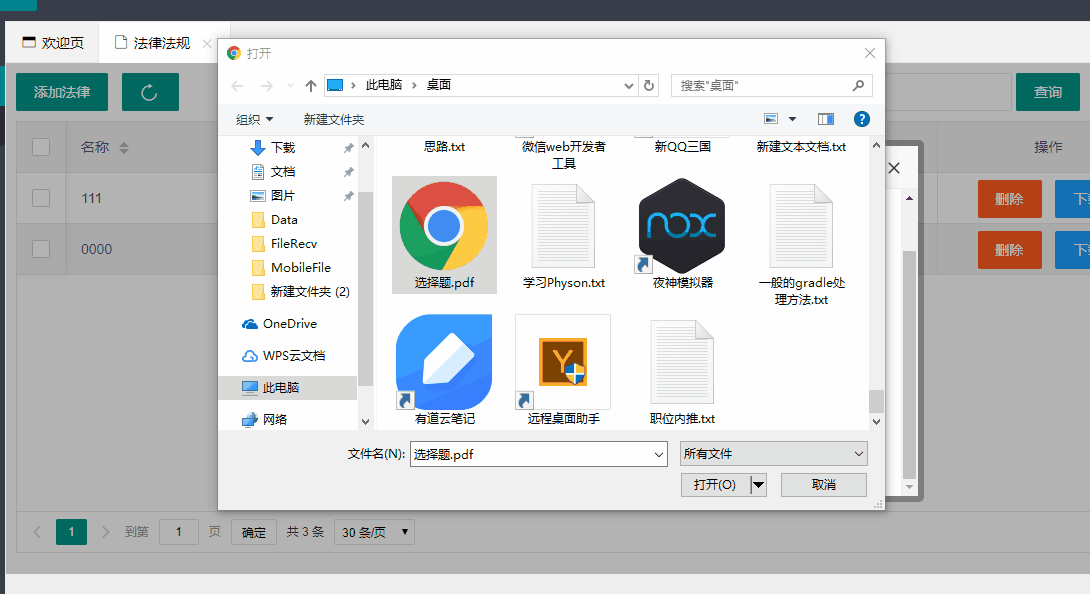最近在学Springboot相关知识,这次用Springboot做了一个上传下载的功能,项目demo
上传一个法律名及其发布的年份等信息,然后还要能上传一个pdf文件(这里限制下上传的后缀名就可以),上传之后,点击操作中的下载,下载对应的pdf文件。
预览:


1.前期准备
编辑器:IDEA/eclipse/myeclipse
layui文档的bang助:layui开发使用文档
根据项目结构图:

标记java文件夹为Source root
resources为resources root
为了迎合SSM框架的习惯 创建web文件夹

配置web

详细的pom.xml等配置可以参见我的项目目录 这里不一一展开了 主要说一下各个目录文件夹的作用。
resources目录下的application.properties是spring相关配置文件夹
generatorConfig是逆向工程的配置文件
webapp目录下 public是JS/json/css等静态资源
upload是上传文件存放的文件夹
WEB-INF是存放jsp等渲染的网页模板文件的文件夹
2.架构设计(MVC)

Model:dao+service+model三个包实现数据库连接以及使用数据库实现持久化存储
View:webapp包下的jsp等网页渲染文件
C:controller包下的多个控制器
3.数据库设计

没什么好说的 想说的都在图里
4.Code
首先实现上传功能。实现思路:使用layui提供给我们的upload Element。我们上传这个文件,限制后缀名为pdf,限制上传文件最大2048KB等。后台则将上传的File文件使用java的file.transferTo录入upload包下。
View层实现:
layer.jsp:
<div class="layui-form-item">
<div class="layui-input-block">
<div class="layui-upload">
<button type="button" class="layui-btn layui-btn-normal" id="test8">选择文件</button>
<button type="button" class="layui-btn" id="upload">开始上传</button>
<input type="hidden" name="fileName" id="fileName">
</div>
</div>
</div>
以上控件组件
layui.use(['element', 'form', 'table', 'layer', 'vip_table', 'laydate','upload'], function() {
var form = layui.form,
table = layui.table,
layer = layui.layer,
vipTable = layui.vip_table,
element = layui.element,
$ = layui.jquery;
var laydate = layui.laydate;
var upload = layui.upload;
//上传
upload.render({
elem: '#test8'
,url: 'layer/upload'
,auto: false
//,multiple: true
,bindAction: '#upload'
,size: 2048 //最大允许上传的文件大小 2M
,accept: 'file' //允许上传的文件类型
,exts:'pdf'//只上传pdf文档
,done: function(res){
console.log(res)
if(res.code == 1){//成功的回调
//do something (比如将res返回的图片链接保存到表单的隐藏域)
$('#set-add-put input[name="fileName"]').val(res.data.fileName);
$('#upload').hide();
layer.msg(res.msg, {
icon: 6
});
}else if(res.code==2){
layer.msg(res.msg, {
icon: 5
});
}
}
});
以上对upload的监听,并且对返回的状态码1(成功),2(失败)做相应处理。
Controller层:
LayerController:
/**
* 处理上传文件方法请求
* @param file 前台上传的文件对象
* @return
*/
@RequestMapping(value = "Index/layer/upload",method = RequestMethod.POST)
@ResponseBody
public Map<String,Object> uploadOne(HttpServletRequest request,@RequestParam("file")MultipartFile file)
{
Map map=new HashMap();
try {
//上传目录地址
// String uploadDir = request.getSession().getServletContext().getRealPath("upload");
String uploadDir = request.getSession().getServletContext().getRealPath("/") +"upload/";
//如果目录不存在,自动创建文件夹
File dir = new File(uploadDir);
if(!dir.exists())
{
dir.mkdir();
}
//调用上传方法
String fileName=upload.executeUpload(uploadDir,file);
uploadDir=uploadDir.substring(0,uploadDir.length()-1);
map.put("fileName",fileName);
map.put("dir",uploadDir);
}catch (Exception e)
{
//打印错误堆栈信息
e.printStackTrace();
return api.returnJson(2,"上传失败",map);
}
return api.returnJson(1,"上传成功",map);
}
相关的工具类:
Api.java:
package com.example.sl.layer.util;
import com.example.sl.layer.model.Layer;
import java.util.HashMap;
import java.util.List;
import java.util.Map;
//接口
//code=1 success 2 fail 3 warning
public class Api {
public Map<String,Object> returnJson(int code, String msg){
Map map=new HashMap();
map.put("code",code);
map.put("msg",msg);
return map;
}
public Map<String,Object> returnJson(int code, String msg, List<Map> data){
Map map=new HashMap();
map.put("code",code);
map.put("msg",msg);
map.put("data",data);
return map;
}
public Map<String,Object> returnJson(int code, String msg, Map data){
Map map=new HashMap();
map.put("code",code);
map.put("msg",msg);
map.put("data",data);
return map;
}
public Map<String,Object> returnJson(int code, String msg, int count,List<Layer> data){
Map map=new HashMap();
map.put("code",code);
map.put("msg",msg);
map.put("count",count);
map.put("data",data);
return map;
}
}
Upload.java:
package com.example.sl.layer.util;
import org.springframework.web.multipart.MultipartFile;
import java.io.File;
import java.util.UUID;
//上传
public class Upload {
/**
* 提取上传方法为公共方法
* @param uploadDir 上传文件目录
* @param file 上传对象
* @throws Exception
*/
public String executeUpload(String uploadDir,MultipartFile file) throws Exception
{
//文件后缀名
String suffix = file.getOriginalFilename().substring(file.getOriginalFilename().lastIndexOf("."));
//上传文件名
String filename = UUID.randomUUID() + suffix;
//服务器端保存的文件对象
File serverFile = new File(uploadDir + filename);
//将上传的文件写入到服务器端文件内
file.transferTo(serverFile);
return filename;
}
}
顺带一提,这里返回给前端的数据有:fileName文件名还有dir文件路径,之后做下载的时候会用到。
Model层:
model包下的Layer.java实体类:
package com.example.sl.layer.model;
import com.fasterxml.jackson.annotation.JsonFormat;
import java.util.Date;
public class Layer {
private String layerId;
private String layerName;
private String description;
@JsonFormat(pattern="yyyy",timezone="GMT+8")
private Date releaseTime;
@JsonFormat(pattern="yyyy",timezone="GMT+8")
private Date recordTime;
private String fileName;
public String getLayerId() {
return layerId;
}
public void setLayerId(String layerId) {
this.layerId = layerId == null ? null : layerId.trim();
}
public String getLayerName() {
return layerName;
}
public void setLayerName(String layerName) {
this.layerName = layerName == null ? null : layerName.trim();
}
public String getDescription() {
return description;
}
public void setDescription(String description) {
this.description = description == null ? null : description.trim();
}
public Date getReleaseTime() {
return releaseTime;
}
@JsonFormat(pattern="yyyy",timezone="GMT+8")
public void setReleaseTime(Date releaseTime) {
this.releaseTime = releaseTime;
}
public Date getRecordTime() {
return recordTime;
}
@JsonFormat(pattern="yyyy",timezone="GMT+8")
public void setRecordTime(Date recordTime) {
this.recordTime = recordTime;
}
public String getFileName() {
return fileName;
}
public void setFileName(String fileName) {
this.fileName = fileName == null ? null : fileName.trim();
}
}
dao包:LayerMapper:
package com.example.sl.layer.dao;
import com.example.sl.layer.model.Layer;
import org.apache.ibatis.annotations.Param;
import java.util.Date;
import java.util.List;
public interface LayerMapper {
int deleteByPrimaryKey(String layerId);
int insert(Layer record);
Layer selectByPrimaryKey(String layerId);
List<Layer> selectAll();
Layer selectByLayerName(String layerName);
List<Layer> selectByDescription(String description);
int updateByPrimaryKey(Layer record);
List<Layer> selectByTime(@Param("time1")Date releaseTime1,@Param("time2") Date releaseTime2);
}
service包:
LayerService:
package com.example.sl.layer.service;
import com.example.sl.layer.model.Layer;
import java.util.Date;
import java.util.List;
public interface LayerService {
public List<Layer> findAllLayers();
public int InsertLayer(Layer layer);
public int deleteLayer(String layerId);
public Layer findByLayerName(String layerName);
public List<Layer> findByDescription(String description);
public List<Layer> findByTime(Date time1,Date time2);
}
LayerServiceImpl:
package com.example.sl.layer.service;
import com.example.sl.layer.dao.LayerMapper;
import com.example.sl.layer.model.Layer;
import org.springframework.stereotype.Service;
import org.springframework.transaction.annotation.Transactional;
import javax.annotation.Resource;
import java.util.Date;
import java.util.List;
@Service("layerService")
@Transactional
public class LayerServiceImpl implements LayerService{
@Resource
private LayerMapper layerMapper;
@Override
public List<Layer> findAllLayers() {
return layerMapper.selectAll();
}
@Override
public int InsertLayer(Layer layer) {
return layerMapper.insert(layer);
}
@Override
public int deleteLayer(String layerId) {
return layerMapper.deleteByPrimaryKey(layerId);
}
@Override
public Layer findByLayerName(String layerName) {
return layerMapper.selectByLayerName(layerName);
}
@Override
public List<Layer> findByDescription(String description) {
return layerMapper.selectByDescription(description);
}
@Override
public List<Layer> findByTime(Date time1, Date time2) {
return layerMapper.selectByTime(time1,time2);
}
}
这里使用了jackson作date解析 所以实体类上有注解
5.效果一览
以上就完成了上传功能,让我们来看看效果

帮助到你了就给颗小吧~
